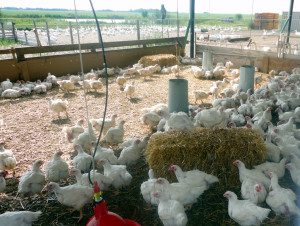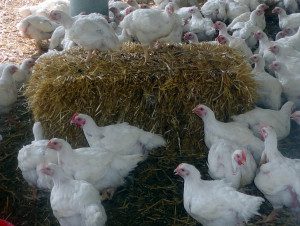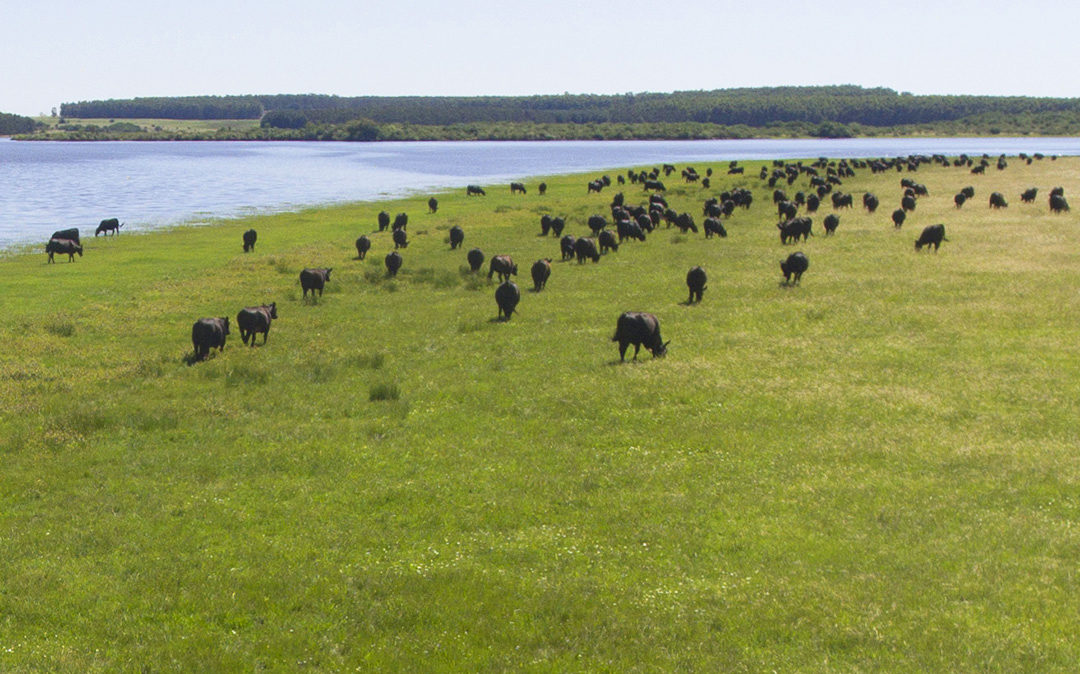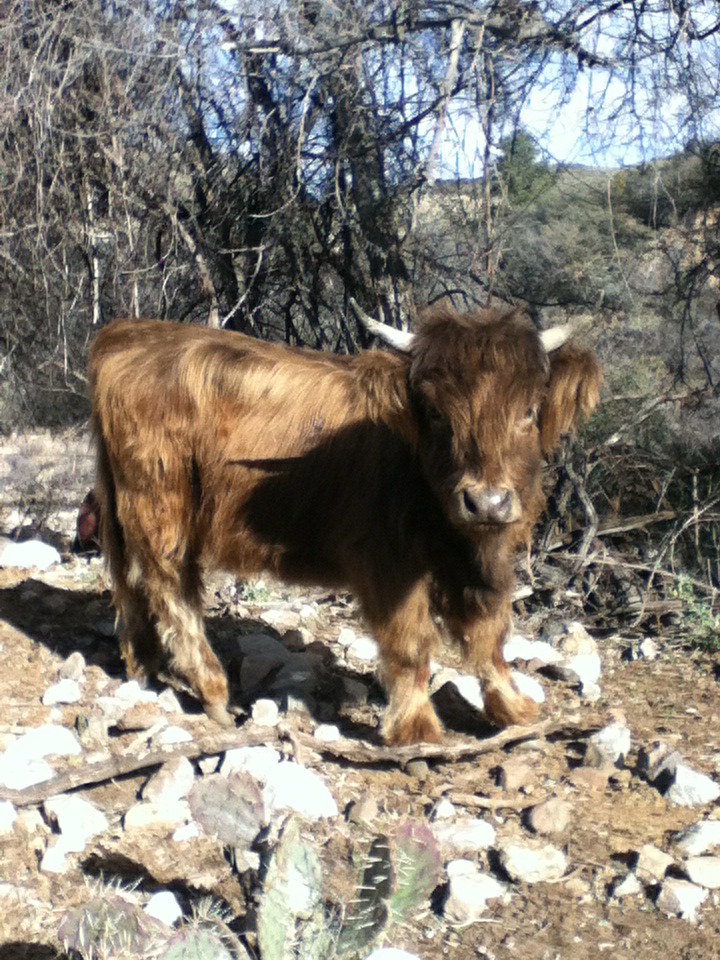 Calgary, Alberta, Canada
Calgary, Alberta, Canada
Tony Entz of Lone Pine Colony and L.P. Farm Fresh Chicken in Calgary, Alberta, Canada, first saw the Certified Humane® label on products in Sobeys and Safeway.
“I looked it up on the website when I got home,” he recalled. “I read through the standards and thought, we do that, and we do that, and we do that. That’s when I thought, ‘We need to become Certified Humane®.’ You can care for your animals as much as you like, but if no one knows you are doing it, then it won’t motivate people who care about animals to check out your product.”
Tony lives and works with his dad, Peter, on Lone Pine Colony, a Hutterite colony that originated in 1999.
Hutterites are a communal people dating back to the 1500s, originating in Germany, Russia and the Czech Republic. When they migrated to North America, many headed to Canada in 1918, where generations still live in hundreds of scattered colonies. A small number of families live and work together on these Hutterite colonies, where they raise livestock and produce manufactured goods to sell for the benefit of the community.
”Everyone owns everything and everyone helps each other,” said Tony.
 400 years of family farming
400 years of family farming
Tony started helping on the farm when he was just 8-years-old. “When I wasn’t in school, it was the highlight of my day to help care for the animals on the farm,” he says.
Today, Tony and his dad, Peter, handle the day-to-day operations of the 8,000-acre farm in the Lone Pine Colony. They manage 4,000 to 9,000 chickens, depending on the time of year.
Between April and October, Lone Pine Colony raises their birds outside, “in fresh air and sunshine,” said Tony. When the cold weather arrives, the birds are moved inside to heated and well-ventilated barns.
“We have to keep the birds nice and dry during the winter,” said Tony. “It’s much more work taking care of them inside compared to outside. So we are happy to let the birds outside again as soon as it warms up in the spring.”
Becoming Certified Humane®
Lone Pine Colony raises chickens without antibiotics or hormones, which meets Certified Humane’s® standards of animal care. They are also fed a homegrown grain with no animal or soy proteins.
Per Certified Humane® standards, Tony says they added recreational enhancements for the birds, like bales of hay, so they can exhibit some natural behaviors.
“I know they like it,” said Tony. “As soon as we put the bales of hay in the yard, several jumped right up on it. It’s just natural for them to sit on something.”
Tony says farming is hard work, but pleasurable work. “It’s always fun, if you like what you do,” he says. “I like working with animals, and I like working with customers and getting feedback on our products. It makes me feel good to hear people like our products.”
Lone Pine Colony produces L.P. Farm Fresh Chicken products, which are available in local stores in Calgary, Alberta. They ship some of their products to other Canadian Provinces.
To find a store near you that sells Certified Humane® products, visit our Where to Shop page or download Certified Humane’s®free mobile App.



Posted: March 18, 2016 by Certified Humane®
Holy Cow Grass-Fed Beef – Wapato, Washington
Janelle and Roy Moses raise Certified Humane® grass-fed beef on a 128-acre farm in Wapato, Washington. Their family farm, Holy Cow Grass-Fed Beef, has 180 cattle and is operated solely by the couple and “some good neighbors who help us out a few times a year.”
“When I call to my cows, they all turn around and ‘moo’ at me,” says Janelle. “All you have to do is open the gate and they come running into the new pasture. Our vet says we have some really laid back cows.”
Janelle and Roy come from a family of farmers. Janelle’s farm background extends back more than 200 years. Her dad was a row crop farmer, her grandparents raised chickens, and her grandmother milked cows and raised pigs. “My dad used to say ‘dirt runs in our veins,’” she said.
Roy was a North Dakota farm boy whose family raised crops via dryland farming – an agricultural technique that taps into the moisture stored in soil to grow crops, rather than using irrigation or rainfall. Dryland farming was a staple of agriculture for millennia in the American West, before dams, aquifers and irrigation systems.
Even though they came from a family of farmers, Janelle and Roy didn’t start Holy Cow Grass-fed beef until the couple was in their 50s. That’s when they bought the 128-acre farm and decided that farming would be a good retirement plan.
When Janelle told her dad they were going to produce Angus/Limousin grass-fed beef, her dad said, “Holy cow, grass-fed beef?” recalled Janelle. “He was amazed and thrilled I was following in his footsteps and the ‘holy cow’ stuck.”
The couple irrigates their farm with rain water, grows grass from seed, and plants four different types of clover for their cows. “It’s sweet, high in protein and the cows love it,” Janelle says.
The cows can spend the night on the back pasture where there is lots of fresh grass to eat or visit the dry pasture where the Moses’ set out hay and extra food. They collect the waste from the dry pasture area to make fertilizer for their grass crops.
They have 4 high marbling angus bulls and 100 heifers who can roam the entire farm to breed naturally. When the heifers give birth, the calves are tagged pink and blue, depending on their sex. The calves are allowed to remain with their mother until the next calf arrives, which occurs 9 months later. “We try to keep them together as much as possible,” says Janelle. “We help them ween off their mom around 7 months, so she has a break from nursing. But the calf remains with her until the second calf arrives and her focus is on the new calf. Then and only then do we separate them.”
The Moses’ says they chose the Certified Humane Raised and Handled® certification to demonstrate to their customers their commitment to animal welfare. Everything is grown naturally and chemical-free. They plant native grasses, grow grass seed for the cows, and raised grass-fed and grass-finished beef on prime farm land, which they rotate for optimal grazing for the animals.
Most people raise beef on hillsides or grazing land, but they have the kind of fertile crop land soils that makes is ideal for the high quality grass the animals enjoy.
The couple believes “there is a right and wrong way to treat animals,” said Janelle. “It makes sense to keep your animals happy and healthy, free of stress and eating high-quality diets. The Certified Humane® program goes hand-in-hand with our animal welfare policies. Because we are inspected every year, we receive feedback and know we’re doing a good job on raising our animals humanely.”
Certified Humane® Holy Cow Grass Fed beef is available from their website at holycowgrassfed.com for residents in California, Oregon, Washington and Idaho residents.
Check out the Certified Humane “Where to Buy” page at https://certifiedhumane.org/take-action-for-farm-animals/shop/#/map or download the free Certified Humane App, by going to the App store for IPhone or Google Play for androids.
Posted: March 18, 2016 by Certified Humane®
Gryphon Ranch – Globe, Arizona
Gryphon Ranch, a 469-acre cattle ranch in the Pinal mountains of Globe, Arizona, operated by Jim and Carol Ptak, is now part of Humane Farm Animal Care’s Certified Humane program.
The couple got their start in cattle farming in 2011 when their 101-acre hay farm in Washington state had leftover hay from the previous season. “At that point, you only have two choices,” says Carol, “You take it out to the barn and burn it or buy something that eats it. We purchased our first two Scottish Highland steers that year.”
Scottish Highland cattle, a hardy breed of cattle developed in Scotland to thrive in rocky terrains, look like yaks, but graze like goats. The couple only intended to buy just two steers, but a neighbor who raised Scottish Highland cattle failed to secure sufficient feed for his fold one winter. They ended up boarding his cattle for six months. In exchange for the help, the couple received two cow/calf pairs, both cows turned out to be pregnant. The Ptaks went from two to 10 cattle pretty quickly.
As their cattle farm grew, they made a trip to Arizona and realized the milder and less humid climate might be a better fit for their family. They bought a ranch in Globe, Arizona, brought the Gryphon Ranch name and their 19 Scottish Highland Cattle in May 2014. The animals made the trip easily and adapted quickly to their new surroundings.
But the Ptak’s had their own adapting to do. The couple had lived in rural areas before, but never this remote. Their Arizona ranch was two miles off the main road at the end of rocky canyon where nobody passes through. They had to learn to live off the grid. They had solar power, but the existing system had a catastrophic failure shortly after moving in. They had a water heater fail and water lines rupture. Half their home heating system went down in the first month of the first winter and the other half failed before the end of that first winter. They also learned to not leave any open doors during the summer into the house because local animals liked to come in and visit, from tarantulas to rattlesnakes.
“Our first year was a big education for us,” says Carol. “The animals adapted just fine though. They love the hilly terrain.”
Animal welfare is a key component of Gryphon Ranch’s operations. The couple interacts with the cattle twice a day to ensure everyone in the herd is healthy and happy. They even groom and brush the cattle’s long coats.
So when the Ptak’s learned about the Certified Humane Raised and Handled® program, they liked the superior animal welfare standards and felt it would be a good fit for their approach to animal care.
“We’re all about the sustainability and humane treatment of animals,” says Carol. “With all the animal rights groups trying to get rid of farm animals, we believe that one can still eat meat and be humane. We wanted to join the program as a way to distinguish ourselves in the marketplace and show our customers that beef can be raised in a humane manner. Certified Humane is a way of bringing these standards to the industry.”
The Ptak’s allow their cattle to naturally forage, breed and interact over the nearly 1,200 grazing acres. Because of the remote location of the ranch, they have a “closed herd” – animals that never do or will come into contact with other cattle – so they don’t have to vaccinate them. They are raised without antibiotics, corn, and no GMOs.
Because the cattle graze like goats, there is significantly less impact on the ecology around them too. The cattle’s grazing habits remove the flammable underbrush and open up areas for additional grass to grow, which in turn is better for the cattle as well as the local wildlife like deer, javelin and rabbit.
The Ptaks work the ranch on their own, so can maintain a close eye on the animals. “Our home is centrally located on the property so we can hear what’s going on all the time,” says Carol.
Like many Certified Humane farms, Gryphon Ranch encourages customers to visit the ranch and see how their cattle is raised. “We spoil them,” says Carol. “Having good animal welfare means not only happy animals, but also the best product for our customers.”
Their breeding stock is all registered with the American Highland Cattle Association. Because Gryphon Ranch does not send their cattle to a slaughterhouse (instead hiring someone to come to the property to handle this), federal law only allows them to sell direct to the consumer.
Check out the Certified Humane “Where to Buy” page at certifiedhumane.org/shop or download the free Certified Humane App, by going to the App store for IPhone or Google Play for androids.
Posted: March 18, 2016 by Certified Humane®
Le-Fort Organic Crops – Creston, California
Roberto Le-Fort and Dolores Howard operate Le-Fort’s Organic Crops, a Certified Humane® farm, in Creston, California, near the city of San Luis Obispo in the Central Coast region of California.
Their organic farm grows vegetables, fruits and herbs and raises free-range chickens, some of which are heritage breeds, for their eggs.
Raised in Chile on his grandmother’s farm, Roberto received his degree in agricultural technology from Escuela Agricola San Fernando Chile. While working as an agricultural advising consultant for an agricultural extension program and INACAP, a technology institute in Chile, he made the decision to come to the U.S. He arrived in Hawaii, where he picked coffee, and then moved to California where he delivered pizzas until he could afford the down payment for the farm in 1997.
Dolores worked as a professor of English as a Second Language and Spanish at Santa Barbara City College. The couple met in 2011, and Dolores added farmer to her resume. At the time, the farm only had 25 chickens.
Roberto’s degree included courses in animal husbandry and the two wanted to expand their laying hen operation and provide the best and most humane life for chickens on the farm
When they heard about Humane Farm Animal Care’s Certified Humane Raised and Handled® program, they decided to implement the Animal Care Standards on their farm. In order to meet those standards, they applied for and received a small Fund-A-Farmer grant to make the necessary changes.
“We didn’t have to do too much,” said Dolores. “We handle the chickens well. We just needed more nests, more perches, and more shade for them. We got our rulers out and started making the improvements for the chickens.”
In addition, the couple also installed patio misters and planted cottonwood trees on the property to keep the hens cool and provide natural shade.
Le-Fort’s Organic Crops now cares for more than 350 laying hens under Humane Farm Animal Care’s Animal Care Standards. “We’re not doing this to increase egg sales,” said Dolores “We’re doing this to provide the best possible life for our chickens. Interestingly, though, people at the farmer’s markets tell us that they think our care improves the quality and taste of the eggs.”
Dolores and Roberto manage the entire farm themselves with occasional help from family, friends and temporary help. But the biggest helper might be Honey, a lab mix who showed up on their farm as a puppy in 2010.
“Honey thinks the chickens are her babies and really watches over them,” says Dolores. “She protects the chickens, barking and chasing away any predators, like raccoons, that she might hear around the chicken coop at night. She can find a chicken that has strayed away.”
Of course, the chickens don’t just lay eggs; they also help with the vitality of the farm. With the drought in California, the Le-Forts needed a way to nourish the soil for their vegetable and herbs, and the chickens have become “a serious partner in their drought-intensive composting effort,” said Dolores. “Sandy soil loses water quickly. Chicken poop helps us amend the soil to keep everything growing. And with 350 laying hens, we have plenty of that to clean up.”
The couple says the best thing about becoming Certified Humane® is that “we know we are treating our chickens fairly and giving them the best life possible in return for the eggs that they provide for us,” Dolores said. “We got expert advice on how to do what’s best for our animals. That doesn’t replace loving and caring for them, because that can guide you too, but we’re grateful that Certified Humane® has shown us what laying hens need on the farm to be healthy.”
Posted: June 8, 2015 by Certified Humane®
Lone Pine Colony (L.P. Farm Fresh Chicken)
Tony Entz of Lone Pine Colony and L.P. Farm Fresh Chicken in Calgary, Alberta, Canada, first saw the Certified Humane® label on products in Sobeys and Safeway.
“I looked it up on the website when I got home,” he recalled. “I read through the standards and thought, we do that, and we do that, and we do that. That’s when I thought, ‘We need to become Certified Humane®.’ You can care for your animals as much as you like, but if no one knows you are doing it, then it won’t motivate people who care about animals to check out your product.”
Tony lives and works with his dad, Peter, on Lone Pine Colony, a Hutterite colony that originated in 1999.
Hutterites are a communal people dating back to the 1500s, originating in Germany, Russia and the Czech Republic. When they migrated to North America, many headed to Canada in 1918, where generations still live in hundreds of scattered colonies. A small number of families live and work together on these Hutterite colonies, where they raise livestock and produce manufactured goods to sell for the benefit of the community.
”Everyone owns everything and everyone helps each other,” said Tony.
Tony started helping on the farm when he was just 8-years-old. “When I wasn’t in school, it was the highlight of my day to help care for the animals on the farm,” he says.
Today, Tony and his dad, Peter, handle the day-to-day operations of the 8,000-acre farm in the Lone Pine Colony. They manage 4,000 to 9,000 chickens, depending on the time of year.
Between April and October, Lone Pine Colony raises their birds outside, “in fresh air and sunshine,” said Tony. When the cold weather arrives, the birds are moved inside to heated and well-ventilated barns.
“We have to keep the birds nice and dry during the winter,” said Tony. “It’s much more work taking care of them inside compared to outside. So we are happy to let the birds outside again as soon as it warms up in the spring.”
Becoming Certified Humane®
Lone Pine Colony raises chickens without antibiotics or hormones, which meets Certified Humane’s® standards of animal care. They are also fed a homegrown grain with no animal or soy proteins.
Per Certified Humane® standards, Tony says they added recreational enhancements for the birds, like bales of hay, so they can exhibit some natural behaviors.
“I know they like it,” said Tony. “As soon as we put the bales of hay in the yard, several jumped right up on it. It’s just natural for them to sit on something.”
Tony says farming is hard work, but pleasurable work. “It’s always fun, if you like what you do,” he says. “I like working with animals, and I like working with customers and getting feedback on our products. It makes me feel good to hear people like our products.”
Lone Pine Colony produces L.P. Farm Fresh Chicken products, which are available in local stores in Calgary, Alberta. They ship some of their products to other Canadian Provinces.
To find a store near you that sells Certified Humane® products, visit our Where to Shop page or download Certified Humane’s®free mobile App.
Posted: May 20, 2015 by Certified Humane®
Firefly Farms
Founded by the Tillman-Brown Family in June of 2011, Firefly Farms is a 135-acre farm in North Stonington, Connecticut. The family is committed to raising heritage chickens, pigs and cattle in a natural and humane environment.
Firefly Farms has grown from an original herd of five piglets to a diverse number of hogs – Mulefoots, a Red Wattle, Guinea Hogs, and Tri-Heritage. They have a growing herd of Randall Lineback cattle and a flock of Dorking chickens. Each of their breeds is either critically endangered or threatened according to The Livestock Conservancy. None of their breeds numbers more than 1,000 in the world.
“It may seem to be a conflict that we raise these rare animals for meat, but the reason that they’re endangered is that they lost popularity in favor of other breeds when factory farming became prevalent,” said Allena Tillman-Brown. “To bring them back from endangered, we need to give them renewed purpose and raise them for their original intent, food. This makes every animal we raise precious and critical to the overall survival of the breed.”
Firefly Farm animals are all pasture or forest raised. In addition to their supplemented diets, they are allowed to forage for food and are kept in environments natural to their species.
“Our pigs live in large groups in the woods, foraging, sleeping in piles, and enjoying the very essence of being a pig,” said Allena. “Our piglets stay with their mothers until they are naturally weaned, as do our calves. Our cows have a variety of pastures to suit their needs and the chickens have chicken tractors (movable chicken coops without floors) that are moved twice daily to give them access to fresh grass. Except for protective fences, our animals get to live as their ancestors did.”
Firefly Farms also uses rotational grazing, which keeps the animals moving so no one area is negatively impacted by their presence and the animals always benefit from having fresh grazing land to explore.
“A certified forester who specializes in woodland restoration showed us where to create new pasture and how to improve the overall health of the existing forest,” said Allena. “Our pigs have done a wonderful job removing scrub brush and invasive species so native flora and fauna can return. They love to be turned out on new pasture with all the joys of finding new areas to root and wallow.”
“It seemed like a natural next step to become Certified Humane®,” said Dugan. “Humane Farm Animal Care’s goals and our goals are one and the same.”
As of January 2015, all four family members work for Firefly Farms in various capacities. Van Brown handles the bookkeeping and correspondences, Beth Tillman works with Dugan Tillman-Brown on Firefly Farms; and Allena Tillman-Brown handles marketing and events.
All of them, however, have been boar wranglers, mother hens to various babies, and educators for people interested in learning about how to operate a family farm that keeps the health and well-being of the animals as their number one priority.
“Just because these animals are raised for food, doesn’t mean we do not love them, care for them, and play with them,” said Allena. “We are with them at birth and walk alongside them to the end. Our mission is to make sure each animal has quality of life here.”
To learn more, visit www.fireflyfarmsllc.com.